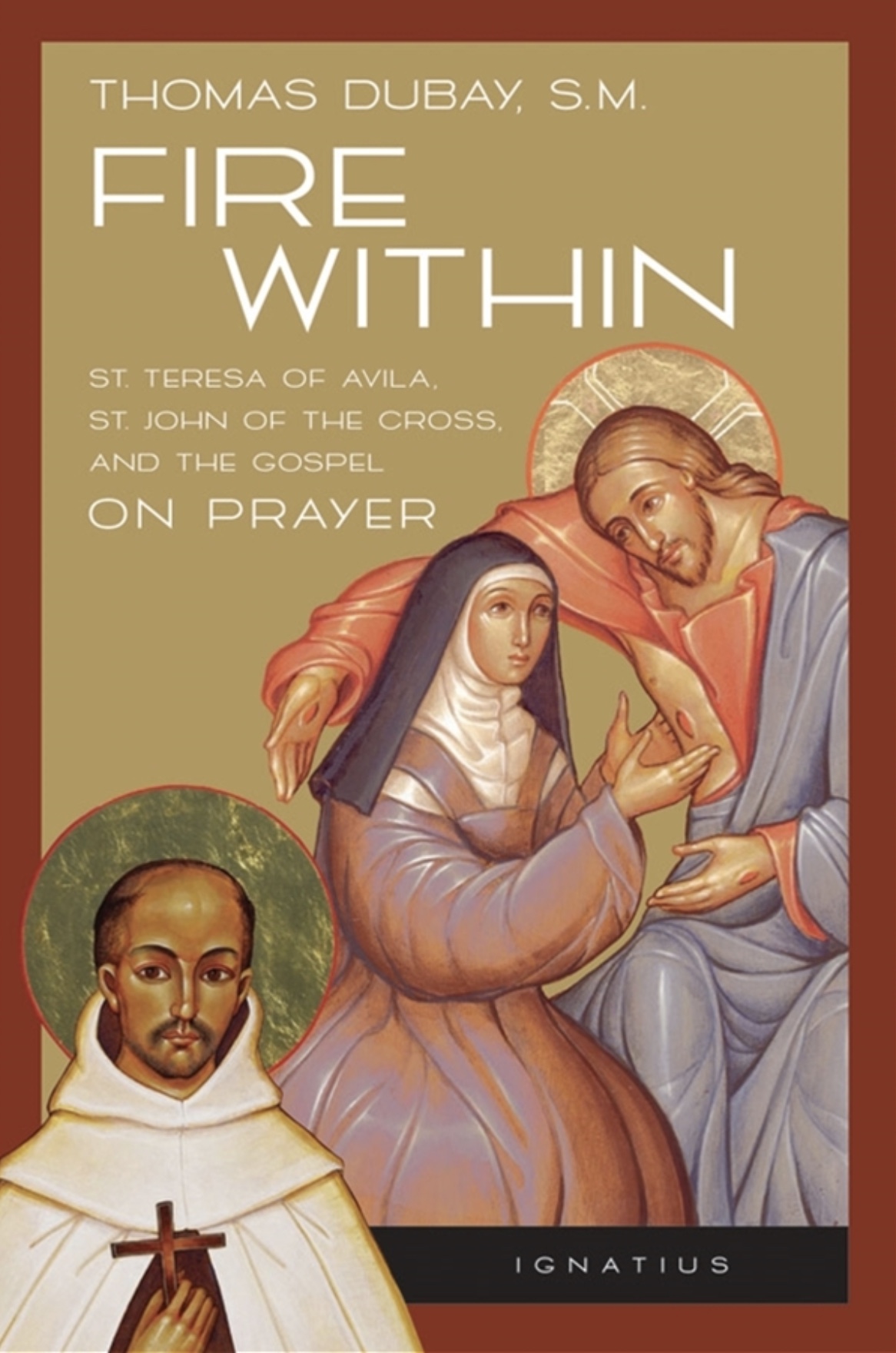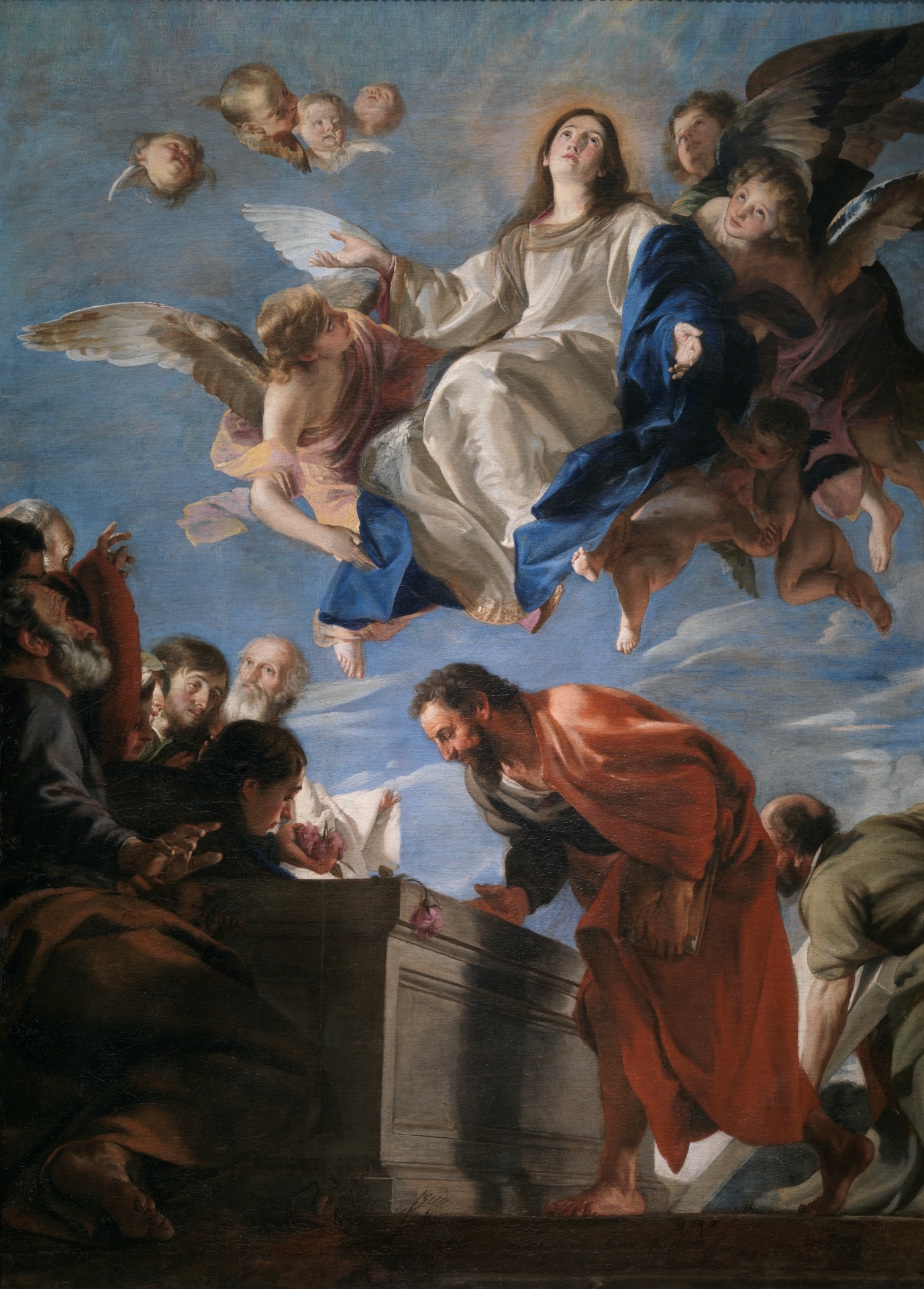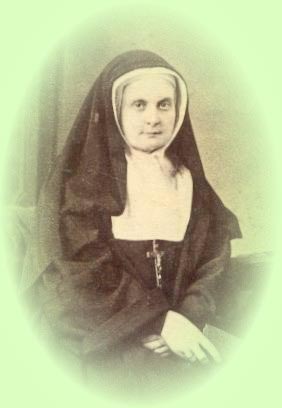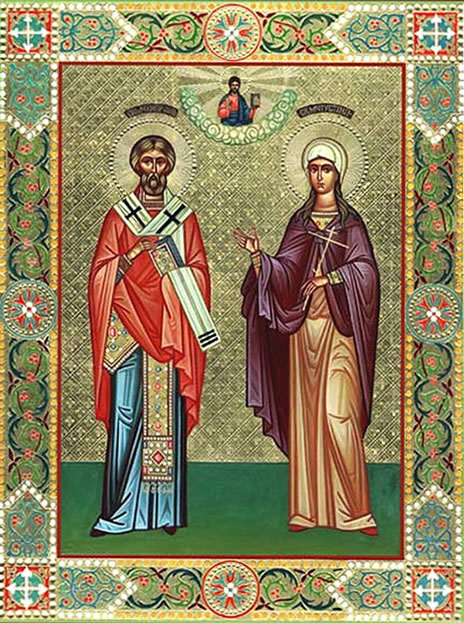
I have heard in my “travels” of the evangelistic kind, of adults converting to Catholicism by “reading their way into the Church”. Hence, this blog. All is grace.
-by Father Francis Xavier Weninger, 1876
“Saint Chrysanthus is one of the many who have experienced how useful and beneficial is the reading of devout books, especially the Gospel. He was born of heathen parents. Polemius his father, stood so high with the emperor, that he was raised to the dignity of a Senator. Chrysanthus’ greatest pleasure was reading; and one day, by special Providence, the Gospel fell into his hands. He read it through most attentively; but not being able to comprehend it, he secretly requested a Christian to explain it to him. This Christian procured him an opportunity to speak to Carpophorus, a holy and very learned priest, who explained to him all he desired to know, and, with the divine assistance, succeeded so well, that Chrysanthus recognized the falsity of the heathen gods, as well as the truth of the Christian religion, and having been properly instructed, he received holy baptism. After this, he appeared no more at the heathen theatres and sacrifices, but associated with Christians, which awakened in his father the suspicion that his son either desired to adopt the faith of Christ, or perhaps was already enrolled among the number of the faithful.
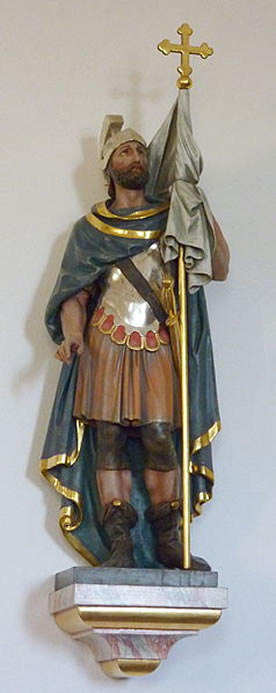
-statue of Saint Chysanthus, Catholic Parish of Saints Chysanthus and Daria, Welcherath, Germany
He called him to account, and as Chrysanthus fearlessly confessed the truth, the angry father cast him into a damp and dark prison, determined to let him die there of hunger. As, however, after a few days, he found him as strong as ever, and as firm in confessing Christ as he had been before, he resorted to other and more horrible means to compel him to forsake Christ. He confined him in a room most luxuriously fitted up, and sent several wicked young women to tempt him, believing that this would be the easiest manner of bringing him back to idolatry. When the first of these women entered, and the chaste Chrysanthus became aware of her intention, he cried loudly to God for assistance, most solemnly declaring that he would much rather die than offend Him. He endeavored to flee, but the room was locked. Hence he did all that was possible under the circumstances. He turned his face away, shut his eyes and closed his ears with both hands, while he continued to pray to the mighty God for assistance. His prayers went to heaven; for the woman was suddenly seized with so invincible a drowsiness, that she sank to the floor, and was carried out of the room. The same happened to the second and the third; and the Saint, recognizing the hand of the Almighty in it, gave due thanks to heaven.
Polemius, however, ascribed it all to witchcraft, and sought in another manner to compass his design. He persuaded Daria, a virgin consecrated to the service of Minerva, to marry his son, in order to draw him gradually away from the Christian faith and bring him back to the gods. Daria consented, and Polemius bringing her to Chrysanthus, introduced her as his future spouse. Chrysanthus, conversing for some time alone with her, told her that he was a Christian, and making her acquainted with the reasons which had induced him to become converted, he succeeded, by the grace of God, in making her promise to embrace the true faith. Not satisfied with this, he explained to her how priceless a treasure chastity is, adding that he was determined to preserve it unspotted. He also said to her that he was willing to marry her, to give her the opportunity of becoming a Christian, but only if she was willing that they should live in perpetual continence. Daria consented cheerfully, after which Chrysanthus announced to his father that he was ready to make Daria his wife.
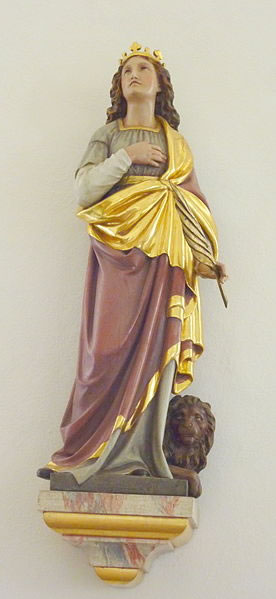
-statue of Saint Daria of Rome, Catholic Parish of Saints Chysanthus and Daria, Welcherath, Germany
Polemius, greatly rejoiced, ordered a splendid wedding, after which the newly-married couple lived as they had agreed upon, in virginal chastity. Soon after, Daria was secretly baptized, and endeavored to lead an edifying life with her spouse. Both assisted, to the best of their ability, the oppressed Christians, and also used every opportunity to bring the infidels to the knowledge of the true God. For a time they were not molested; but when, at length, Celerinus, the Governor, was informed of their conduct; he gave Claudius, the Praetor, orders to investigate the matter. Hence, Chrysanthus was brought into the Temple of Jupiter to sacrifice to the idols, after the manner of the pagans. As he refused to do this, he was scourged so dreadfully, that he doubtless would have died, had not God preserved him by a miracle. After this, he was dragged, laden with heavy chains, into a dark hole, into which all the sewers of the prison emptied. Being locked up in this foul place, the holy man called on the Almighty, and suddenly the darkness around him gave away to a heavenly light; a delicious odor filled the air, and he was freed from his heavy chains. Claudius, in consequence of this and other miracles, desired to be baptized, with his wife, Hilaria, his two sons, Maurus and Jason, and seventy soldiers who were under his command. The emperor was greatly enraged when this news was reported to him, and ordered Claudius drowned, Hilaria hanged, and Maurus and Jason beheaded.
Meanwhile, Daria also was imprisoned on account of her belief in the Christian faith. She evinced, however, no less fortitude than her holy spouse. She was taken into a house of ill-repute to be a prey to wicked men. Daria, in this danger, called on the great protector of the innocent, and God caused a lion to break from his place of confinement and come running to her, as if to guard her from all harm. When the first man entered the room where the chaste virgin was, the lion seized him, threw him to the ground, and then looked up to Daria, as if to ask her whether he should kill him or not. The tender martyr helped the trembling youth to rise, and reproaching him for his wickedness, she exhorted him to do penance, and succeeded in persuading him to become a Christian. The same happened to two others, who, like the first, left her converted. The tyrant raged when he heard of it, and commanded fire to be set to the room in which Daria was, that she might be burnt with the lion. When the fire was kindled, Daria made the sign of the holy cross over her protector, the lion, and sent him away through the flames uninjured. She herself also remained unharmed, though the room was burnt to ashes. Many other miracles were wrought by her and by Saint Chrysanthus, in consequence of which a great many heathens were converted. At last, both were sentenced to be thrown into a deep sand pit outside the city, near the Via Salaria Nova where, covered with stones and sand, they were buried alive, in the year 283 AD.
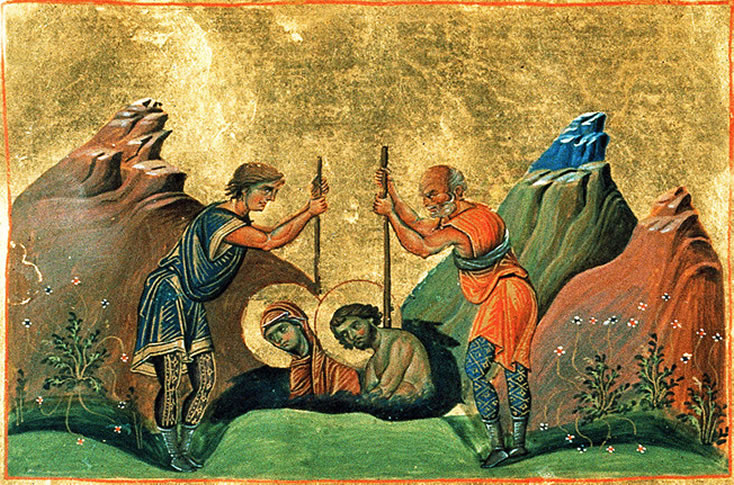
-The Martyrdom of Saints Chrysanthus and Daria of Rome; Menologion of Basil II, Menologion of Basileiou; 11th century illuminated Byzantine manuscript with 430 miniatures; Vatican Library; Italy
Considerations
Saint Chrysanthus shut his eyes and closed his ears with both hands, that he might not see nor hear those who had been sent to tempt him. Oh! how wisely he acted! Numberless persons have fallen into vice and have been precipitated into hell, because they did not guard their eyes from gazing on dangerous persons and objects; or because they listened to flatteries or to impure words and songs. Death came upon them through eyes and ears, like a thief through the window. If they had turned their eyes away and closed their ears, if they had left those who spoke immodestly and sang lascivious songs, they would not have become guilty of sin, and would not have been cast into the depth of hell. The pious king David would not have fallen, if he had not been careless in the use of his eyes. And where would he be, if he had not done penance? The beginning of the misfortunes which assailed the strong Samson, and which ended in his death, was his gazing upon Delilah. Sichem, a noble prince, was tempted to sin, as we are told in Holy Writ, by looking upon the imprudent Dina, and being soon after murdered, was cast into hell. We omit innumerable others whose ruin began in the same manner. Each of these shall cry out, during all eternity: “My eye,” (my ear) “has wasted my soul” (Lament iii.). Imprudent looking about and listening robbed them of their innocence, their piety, the grace and friendship of God, and at last, of salvation. If you do not wish to experience the same, keep your eyes, your ears, and in fact all your senses under control. “Hedge in thy ears with thorns,” admonishes the Wise Man, “hear not a wicked tongue.” (Eccl., xxviii.) “Those who listen voluntarily to sinful speeches, give death permission to enter through the window,” writes Saint Theodore. “The eyes are the leaders of sin,” says Saint Jerome. “To preserve purity of heart, it is necessary to keep a guard over our exterior senses,” says Saint Gregory.
Saint Chrysanthus and Saint Daria were thrown into the greatest danger to sin. They were tempted, but without their fault. They resisted, called on God, and did all in their power not to yield, and God protected them from consenting to do wrong. As these Saints were subjected to exterior temptations, so are many souls tempted interiorly; some through their own fault, others without the reproach of the slightest guilt. To the former belong those who spend their time in idleness; who are intemperate in eating and drinking; who neglect prayer and other good works; who, without reason, seek dangerous company, assist at indecent plays, read unchaste or sensational books; who look at persons immodestly dressed or at unclean pictures; who like to listen to, or indulge in improper jests, or songs; who play indecent games; delight in wanton dances and amusements; make friends and acquaintances of persons of little or no virtue; in short, those who in their manners and actions, dispense with Christian modesty. All these can blame only themselves when they suffer from unclean temptations; they themselves give occasion to them. But there are many who, though they avoid all this, are still violently tempted, as was the case with many Saints in this world. These are not to be blamed for their temptations, as they have not, by their conduct, occasioned them.
The former have every reason to fear that they will commit great sins in consequence of the temptations which they themselves have caused; for it is written: “He that loveth the danger, shall perish in it.” (Eccl., iii.) No one will believe such people when they say that they are sorry to be troubled by such temptations. If this is the truth, why then do they give occasion to them? To imagine that these temptations can easily be overcome, without the divine assistance, is presumption; for, God has nowhere promised His aid to those who throw themselves into danger. They are not worthy of it. What else then, can they expect but that they will frequently fall into sin, and finally into hell? Quite differently must those be judged who are tempted without their own fault. If they do all they can, and pray to God for help, they will not be overcome, but may be assured that the Almighty will assist them, as they manifest their love and fidelity to Him by avoiding everything that may lead them into temptation. And who can believe that God will forsake His faithful servants in their fight?
For the two Saints, whose festival we celebrate today, and for many others, He worked miracles to protect them in their danger. Hence, never give occasion to temptations; and if they nevertheless assail you, trust in God; call on Him, and resist bravely. The whole of hell will be unable to conquer you; for, the Almighty will be your protector. “He is a protector of all who trust in Him.” (Psalm xvii.) “He is a protector in the time of trouble, and the Lord will help and deliver them.” (Psalm xxxvi.)”
================
In 2008 the Reggio Emilia Cathedral in Modena in Northern Italy faced renovations. The workers discovered more than 300 bones belonging to two skeletons in one of the sealed crypts. The skulls were packed inside a pair of silver-and-gold busts deep in a cathedral vault. The relics of Daria & Chrysanthus were venerated and displayed. Carbon dating showed they belonged to a young man and a young woman in their late teens with a radiocarbon date between AD 80 and AD 340.
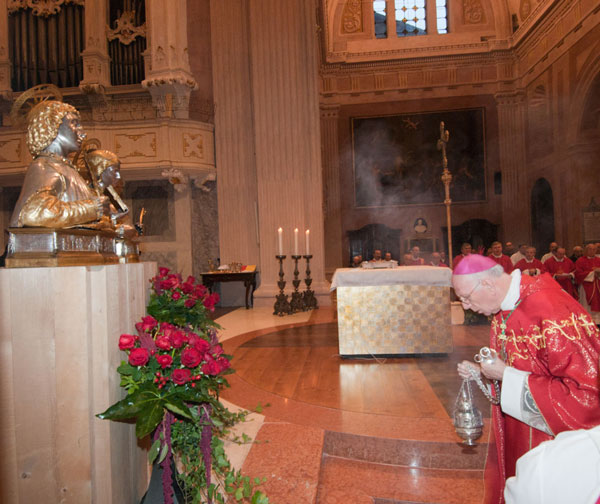
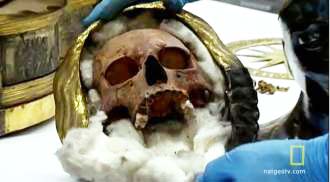
-the skull of Daria
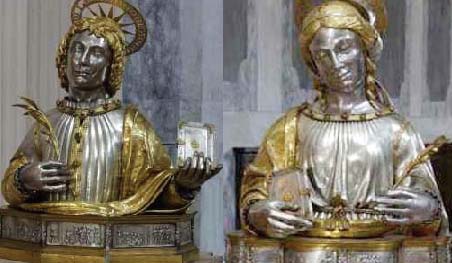
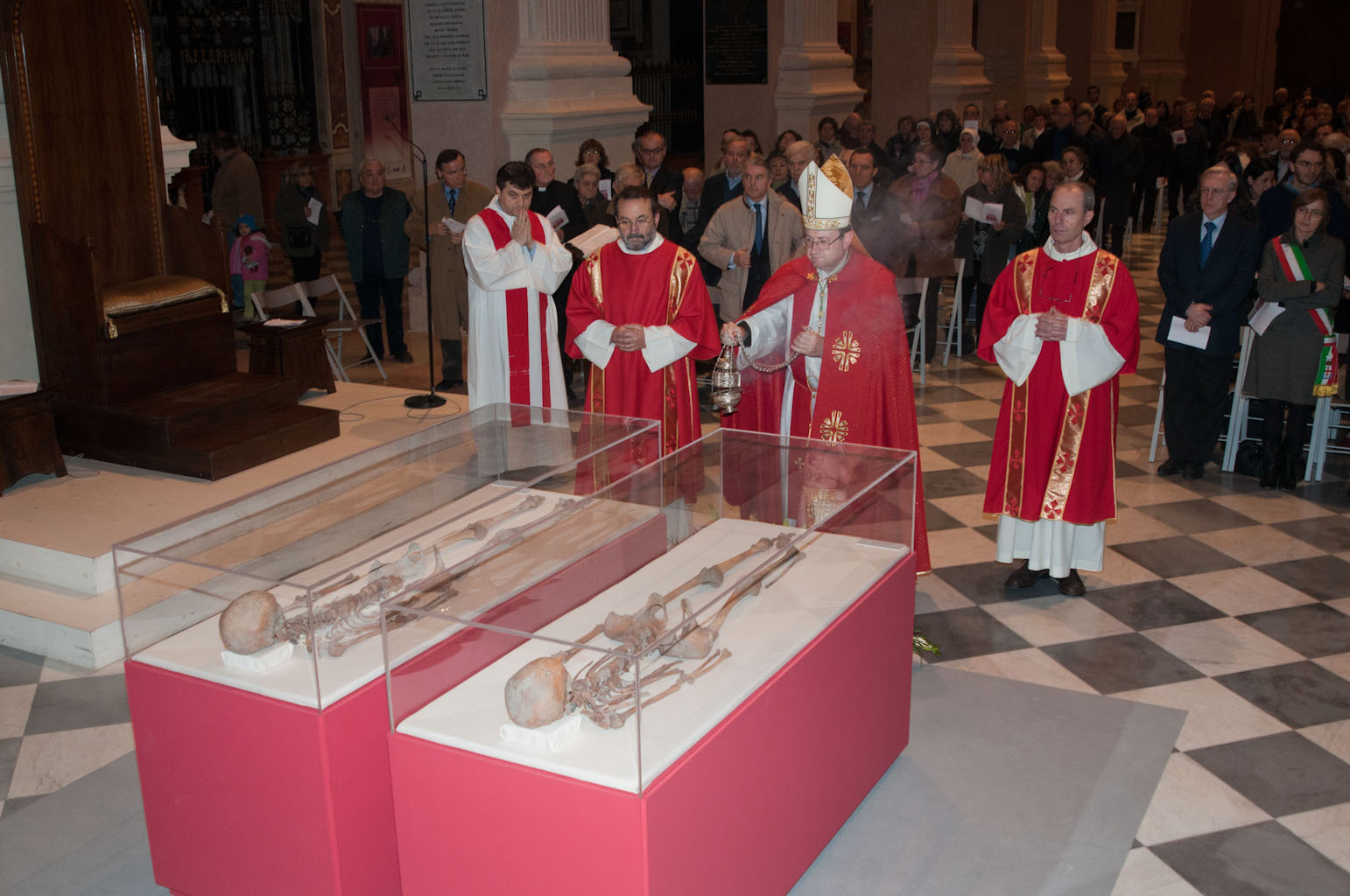
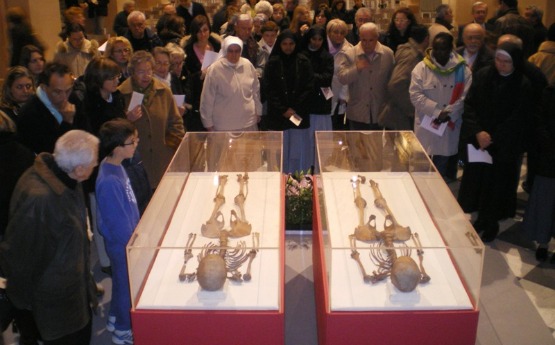
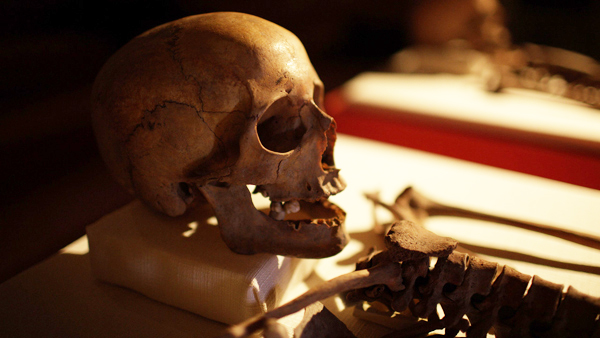
-Daria

-before the altar
Love,
Matthew














